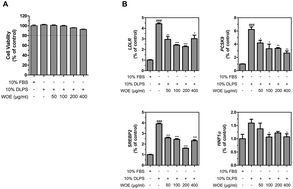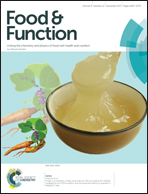Welsh onion extract inhibits PCSK9 expression contributing to the maintenance of the LDLR level under lipid depletion conditions of HepG2 cells
Abstract
Statins mediate the transactivation of PCSK9, which in turn limits their cholesterol-lowering effects via LDL receptor (LDLR) degradation. The objective of the present study was to investigate the mechanism of action by which Welsh onion (Allium fistulosum L. [family Amaryllidaceae]) extract (WOE) regulates LDLR and PCSK9. HepG2 cells were cultured under lipid depletion conditions using a medium supplemented with delipidated serum (DLPS). WOE (50, 100, 200, and 400 μg ml−1) significantly attenuated the DLPS-mediated increases in LDLR, PCSK9, and SREBP2 gene expression. While WOE treatment maintained the DLPS-mediated increases in LDLR protein expression, it dose-dependently and significantly attenuated the DLPS-mediated increases in the protein content of PCSK9. The suppression of PCSK9 was associated with the WOE-mediated reductions in SREBP2, but not HNF1α. WOE also dose-dependently reduced PCSK9 protein expression that was otherwise markedly induced by concomitant statin treatment. WOE-mediated PCSK9 inhibition contributed to LDLR lysosomal degradation suppression, and subsequent LDLR protein stabilization. HPLC analysis indicated that WOE contains kaempferol, quercetin, ferulic acid, and p-coumaric acid. Kaempferol and p-coumaric acid contributed to the maintenance of LDLR expression by inhibiting PCSK9 in lipid depleted HepG2 cells. Altogether, these findings suggest that WOE inhibits PCSK9 transcription and protein expression via the reduction of SREBP2, and decreased PCSK9 further contributes to LDLR degradation prevention and LDLR protein stabilization under conditions of lipoprotein deficiency. The PCSK9 inhibition-mediated mechanism of WOE was likely attributed to the action of kaempferol and p-coumaric acid present in WOE.



 Please wait while we load your content...
Please wait while we load your content...